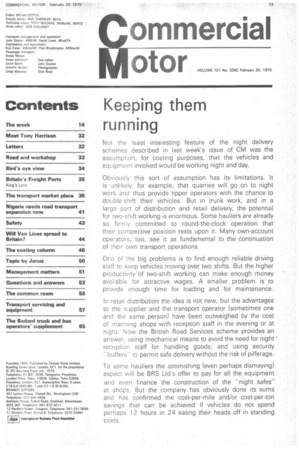Not the least interesting feature of the night delivery schemes
Page 15

If you've noticed an error in this article please click here to report it so we can fix it.
described in last week's issue of CM was the assumption, for costing purposes, that the vehicles and. equipment involved would be working night and day.
Obviously this sort of assumption has its limitations. It is unlikely, for example, that quarries will go on to night work and thus provide tipper operators with the chance to double-shift their vehicles. But in trunk work, and in a large part of distribution and retail delivery, the potential for two-shift working is enormous. Some hauliers are already so firmly committed to round-the-clock operation that their competitive position rests upon it. Many own-account operators, too, see it as fundamental to the continuation of their own transport operations.
One of the big problems is to find, enough reliable driving staff to keep vehicles moving over two shifts. But the higher productivity of two-shift working can make enough money available for attractive wages. A smaller problem is to provide enough time for loading and for maintenance.
In retail distribution the idea is not new, but the advantages to the supplier and the transport operator (sometimes one and the same person) have been outweighed by the cost of manning shops with reception staff in the evening or at night. Now the British Road Services scheme provides an answer, using mechanical means to avoid the need for night reception staff for handling goods, and using security "buffersto permit safe delivery without the risk of pilferage.
To some hauliers the astonishing (even perhaps dismaying) aspect will be BRS Ltd's offer to pay for all the equipment and even finance the construction of the "night safes" at shops. But the company has obviously done its sums and has confirmed the cost-per-mile and/or -cost-per-ton savings that can be achieved if vehicles do not spend perhaps 12 hours in 24 eating their heads off in standing costs.














































































































































































































